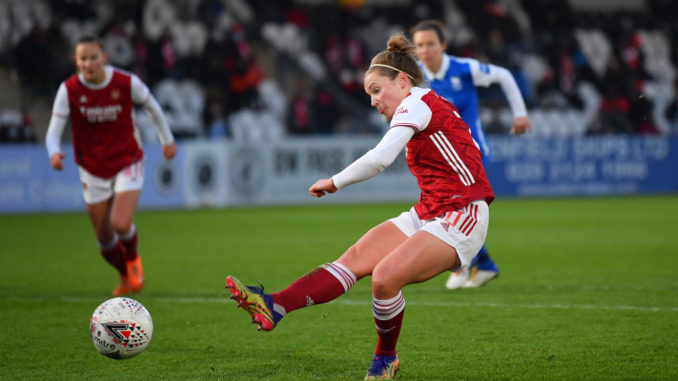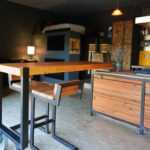
Kim Little captains Arsenal in the FA Women’s Super League and vice-captains the Scotland women’s national team. Little spoke with Sydney Shaw of Just Women’s Sports. The Southern California News Group is partnering with Just Women’s Sports to promote coverage of women’s sports. Sign up for the JWS newsletter here.
How has being in lockdown affected training and games?
The first lockdown from March until, God when was that, until June, obviously that stopped everything completely. And then we restarted again in mid to end of August with the games. And training and games are pretty much back to normal in terms of what we do in terms of training and playing. Obviously the external and the surroundings with fans and interactions in person are obviously way fewer, if not completely missing now.
You kind of get used to it, I suppose. It’s been a few months now, so it feels a bit normal. It’s still very unusual and a unique situation in terms of the restrictions in place even when we are at our training ground, and in the stadiums.
And I read that in February you were coming off of an injury and had surgery on your foot?
Yeah, I had surgery early February, so before the pandemic hit, or around the time when everyone was finding out. When I went into lockdown, I think I was still in a boot at that point actually. I was just going through early stages of my rehab, which was interesting. It seems a long time ago now to be honest.
Was it a hard transition to get back into playing after the lockdown and your rehab?
When you look at it in the whole perspective, I didn’t necessarily miss too much football. So, if I’m looking at it from a selfish perspective, that was obviously good I think. Doing rehab in lockdown was obviously very different, I did most of it at home, which is with no kind of treatment or seeing a physio regularly, not until later down the line into June and stuff when we were allowed to see people and be treated by people. So that was different, but you just adapt, and obviously you can’t do anything about the circumstances. I tried to make the most of the situation with just a focus to be back whenever football started again.
Before the international break, you had a tough loss to Manchester United which knocked you off of the top spot. What do you think needs to happen to get back to the top of the standings this year?
I think the league is more competitive than it’s ever been. All the games are challenging, and you need to be at the top of your game if you want to get the results from them. And we didn’t play particularly well against Man United. They played a lot better, were very physical, and dominated parts of the game which we just didn’t control. It was disappointing to lose, but obviously credit to them for turning up and being better than us.
We can turn it around. I think we need to show up, first and foremost, individually. I think too many of us will put our hands up and say we didn’t play to our potential. And then with that, come together as a collective, and make sure we’re hard to break down, and then obviously our creativity and our ability will take care of itself. But yeah, it’s just focusing on the fundamentals and the basics for us.
Do you think FAWSL is now the most competitive league in the world?
I think it’s hard for me to comment on that. I wouldn’t say I watch too much football from the other leagues, so I can’t say I can comment too much on that. But I think in terms of the players you have here now, in terms of the competitiveness for all the teams, I would say so in comparison to maybe the German or French league, or even the Spanish. I think that’s due to obviously the players that have been here for a long time, but also the influx of international players from Australia, from America, who raise the standard across the board.
We saw a bunch of US national team players jump overseas this year. What do you think it means to have so many big Americans playing in the FAWSL?
I think it’s good for the league over here just to have them come in. I think European players have been coming into the league for the last few years now, but maybe not so much globally from America, and Australia, and different continents. I think it brings another kind of edge to the game, and obviously a bit more exposure to the league here from America and Australia, like I said. And I think it’s great for the women’s game that there’s all this movement and diversity within the league, and it’s only good for providing a great product to watch.
You have also played a few seasons before in the NWSL. How do you think it compares to where you are now?
Yeah, I played in Seattle for three seasons under Laura Harvey. I would say at Seattle we had a few European players and Japanese players, and we played quite a European style. It’s kind of similar to how we play at Arsenal. Obviously, there’s different players so it varies a bit. I think the leagues are so different just for many reasons. The form of the league, and how it works in America is obviously different to Europe in terms of championship matches, playoffs, which we don’t have here. Here we have so many more competitions, the season is so much longer. So, it’s quite nice to have played in both, and to understand the difficulties, and what makes them so good. And then obviously in America the travel is such a big part of it, and you’re going from timezone to timezone weekly. And when I was in England obviously our longest journey was maybe a three or four hour bus journey. So, there’s so many contrasting things about the leagues that make them what they are. I’m glad to experience both, for sure.
 Editor’s note: Thanks for reading this story, which is part of a partnership with Just Women’s Sports, a platform that promotes coverage of women’s sports. Visit their website or sign up for the newsletter here.
Editor’s note: Thanks for reading this story, which is part of a partnership with Just Women’s Sports, a platform that promotes coverage of women’s sports. Visit their website or sign up for the newsletter here.





